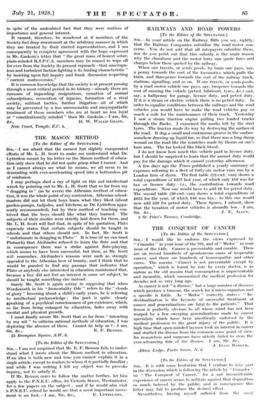THE MASON METHOD [To the Editor of the SPECTATOR.]
Six,--I am afraid that the earnest but slightly exasperated efforts of Mr. L. H. Scott to make me understand what Dr. Lyttelton meant by his letter on the Mason method of educa- tion only show that he did not quite grasp what I meant. And as I cannot always see what he means, we all seem to be deseending with ever-accelerating speed into a bottomless pit of confusion.
I may perhaps shed a ray of light on this sad intellectual wreck by pointing out to Mr. L. H. Scott that so far from my " dragging in " (as he avers) the Athenian method of educa- tion, it was the whole point of my contention. Athenian school- masters did not let their boys learn what they liked (about garden-pumps, tadpoles, and kitchens, as Dr. Lyttelton appa- rently recommended), but by their method of teaching con- trived that the boys should like what they learned. The subjects of their studies were strictly laid down for them, and Mr. L. H. Scott will find that, in spite of his quotation, Plato expressly states that certain subjects should be taught in schools and that others should not. In fact, Mr. Scott is " unfortunate in dragging in Plato." It is true (if we can trust Plutarch) that Alcibiades refused to learn the flute and that in consequence there was a strike against flute-playing, which seems to have been successful, but then, as Mr. Scott will remember, Alcibiades's reasons were such as strongly appealed to the Athenian love of beauty, and I think that he would be puzzled to find any passage that indicates that Plato or anybody else interested in education maintained that, because a boy did not feel an interest in some set subject, he should be taught something else instead.
Surely Mr. Scott is again astray in supposing that when Wordsworth in his " Immortality Ode " refers to the " clouds of glory " hovering about a child's early years, he is referring to intellectual preknowledge : the poet is quite clearly speaking of a psychical consciousness of pm-existence, which, so far from being enlarged by education, fades away with mental and physical growth.
I must finally assure Mr. Scott that so far from " intending by my wit " to criticize rational methods of education, I was deploring the absence of them. Cannot he help us ?—I am,




















































 Previous page
Previous page